Imagine your website as a hidden gem, buried deep within the vast digital world, waiting to be discovered by eager searchers. The right SEO tools are like a compass that guides these searchers straight to your site through the chaotic landscape of the internet. Without proper on-page optimization, even the most promising sites may never get their chance to shine. In this blog post, we will introduce you to the best SEO tools for on-page optimization that will make your website stand out and reach unprecedented altitudes in search rankings. Gear up for an unforgettable journey towards online success!
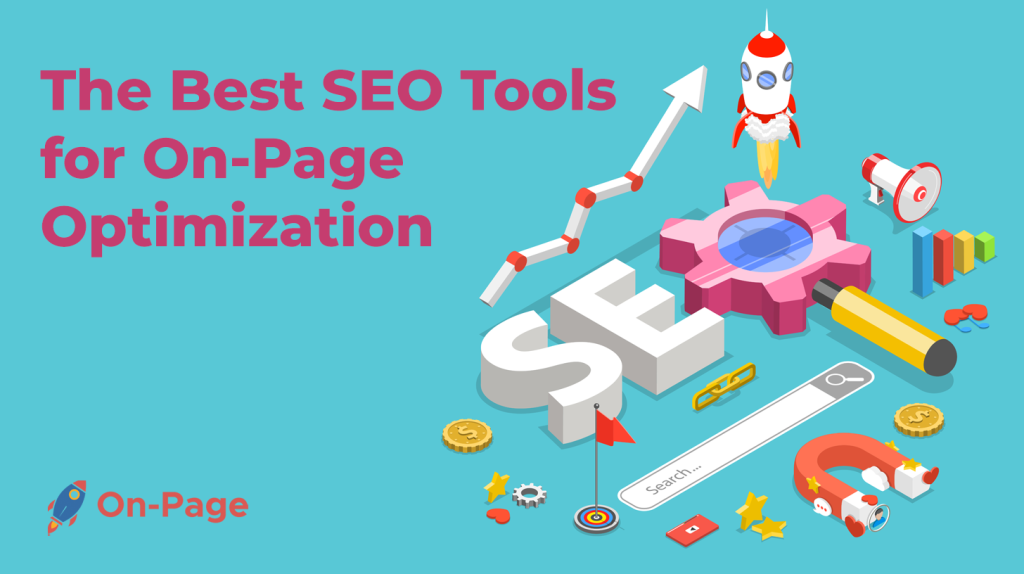
At On-page.ai, we believe that our platform is the best SEO tool for on-page optimization. Our AI-powered tool provides actionable recommendations to improve content relevance, keyword usage, meta data, readability, and other important factors for achieving higher rankings. Other great SEO tools for on-page optimization include Surfer SEO, SE Ranking, Frase, and Ahrefs’ Keyword Explorer. Each of these tools offers unique features to help you achieve better results in your on-page optimization efforts.
Essential On-Page SEO Components
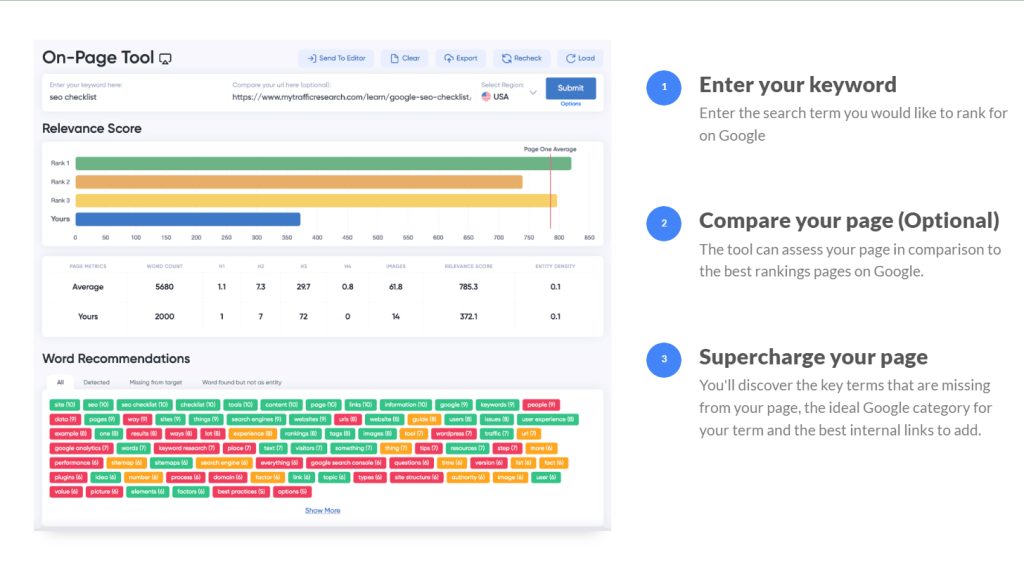
On-page optimization is the foundation of a successful SEO strategy, and it involves optimizing various elements within a website to make it more search engine friendly. The key to on-page optimization is to focus on user intent and providing valuable and relevant content to your audience. With that in mind, here are some of the essential on-page SEO components that you need to optimize:
One of the most important parts of on-page optimization is keyword research and selection. You need to identify the right keywords that are relevant to your business, have high search volume, and low competition. By incorporating these target keywords into your web content in a strategic manner, you can increase your chances of ranking higher in search engine results pages (SERPs).
The importance of keyword placement cannot be overstated. You need to incorporate your target keywords in all the right places such as titles, headings, meta descriptions, alt tags, URL structure, and throughout your web content. However, overusing keywords can negatively impact user experience and result in keyword stuffing penalties from search engines. Therefore, strategic keyword usage with a focus on value-driven content creation will lead to better rankings.
So what about meta tags? Do they still matter? While Google has progressively moved away from relying on metadata for parsing page content as more sophisticated technologies like AI become available to identify relevant text on a webpage for search engines to crawl accurately, including meta data alongside more comprehensive content signals delves deeper into page relevance and provides more information regarding the focus topics discussed – leading to an increase in CTR.
In addition to keyword placement and optimized metadata structure, internal linking plays an essential role in on-page optimization success much like how traffic flows through a network’s highways at rush hour. Strategically linking certain pieces of content together creates crawlable pathways through the website and helps search engines understand the architecture of the site, while providing users easier access to relevant content.
With these vital on-page optimization components in mind, let’s now explore some of the top SEO tools that can aid your efforts in maximizing on-page optimization for higher rankings.
- On-page optimization is crucial for achieving a successful SEO strategy, and it involves optimizing several website elements to make it more user and search engine friendly. Keyword research and selection, strategic keyword placement, optimized metadata structure, and internal linking are some of the essential on-page SEO components that you must optimize. While Google has moved away from relying solely on metadata parsing techniques, including meta tags alongside comprehensive content signals can provide more information regarding focus topics discussed, increase page relevance and overall improve the click-through rate (CTR). To maximize your on-page optimization efforts, you can use various SEO tools to monitor your website’s rankings, analyze your competitors’ strategies, and identify opportunities to improve your website’s performance in search engine results pages (SERPs).
Top SEO Tools for On-Page Optimization
Ensuring your website is optimized for search engine success isn’t always an easy task but it can be made hassle-free with the help of specialized on-page SEO tools. Here are some of the top SEO tools available in today’s market that can help enhance your on-page optimization strategy:
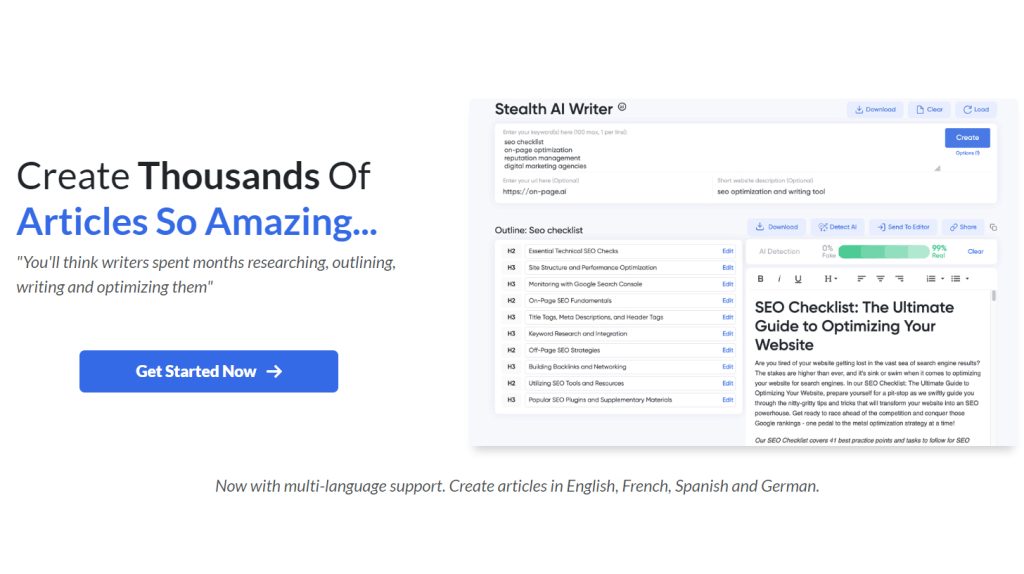
On-Page.ai is a powerful suite of AI-powered SEO tools that include advanced features such as a stealth writer and rewriter, competitive analysis, user experience performance reporting, and more. It provides personalized recommendations based on real-time data analysis and helps optimize all aspects of web content – from page structure to different elements such as headings, images, and alt tags.
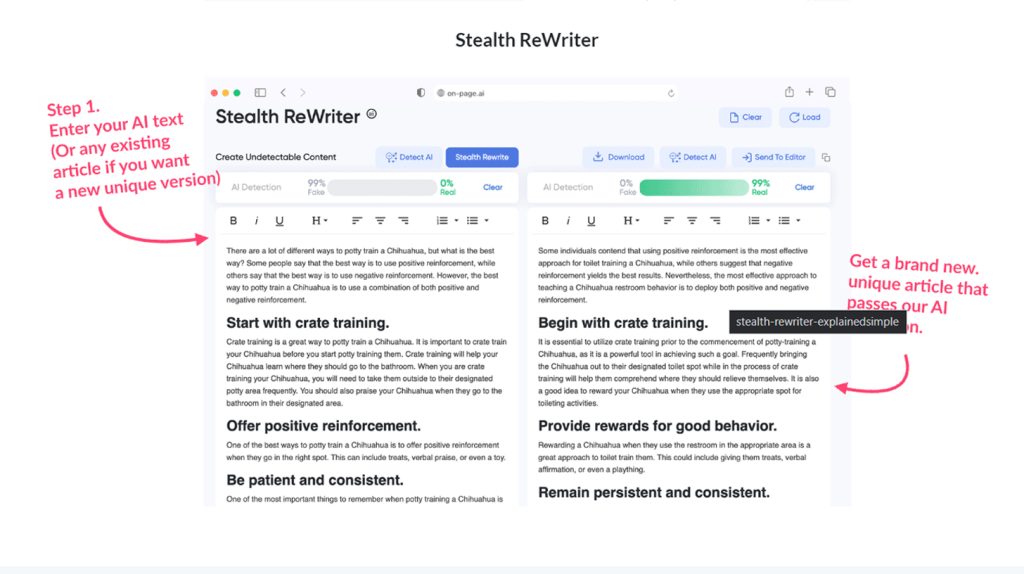
Another tool to consider is Surfer SEO. This all-in-one platform offers various features including SERP analysis and backlink monitoring which provides insights into what’s working effectively as well as suggest areas that need improvement. One notable feature is its page analyzer which compiles detailed information regarding target keywords’ usage surrounding competitors pages appearing in SERPs compared to your own.
SE Ranking is also among the popular on-page SEO tools that offer comprehensive website audits covering all aspects from technical facets like internal and external links or header tags to analyzing content quality through ideal keyword density range or header tag utilization unique to each page, however it may provide overbearing suggestions causing confusion for someone starting out.
At last but not least is Ahrefs Keyword Explorer tool – which focuses on keyword research specifically. Identifying low-competition keywords with an objective scorecard system as well as proper implementation of search intent data, allowing users to identify the right keywords to target with similar terms that competitors are ranking for. It is essentially a powerful tool in a vacuum when it comes to finding search volume data and market level competition statistics.
There are multiple on-page optimization tools available to you, each providing their own unique advantages based on your business’s preferred strategy and understanding of market dynamics. Take the time to research and experiment with different on-page SEO tools until you find the one that fits your specific needs – after all, it’s essential for ensuring your site appears near the top of relevant search queries.
Technical Auditing Applications
Technical SEO auditing is a process of diagnosing and fixing technical issues that prevent search engines from crawling and indexing your website. It’s the foundation of on-page optimization that ensures your website is healthy and accessible to search engines. Technical auditing applications are indispensable tools for identifying these issues and providing actionable solutions.
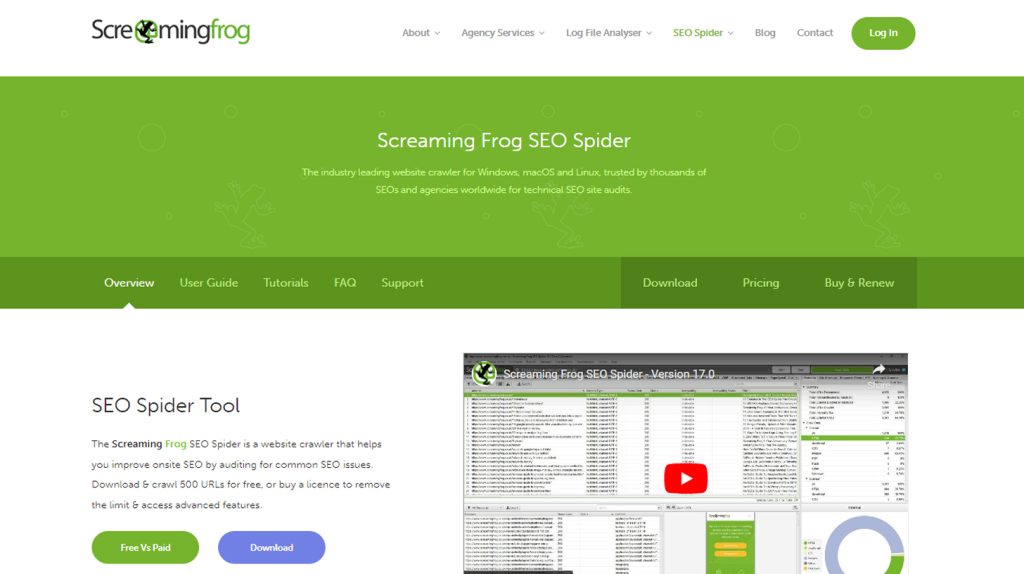
One of the best technical auditing applications available today is Screaming Frog SEO Spider. This tool crawls your website in a similar way that search engine bots do, analyzing every page element and identifying technical issues such as broken links, duplicate content, missing meta descriptions, and other common SEO problems. With its intuitive interface and advanced features, it makes the process of auditing your website a breeze.
For instance, let’s say you’re running an e-commerce store with thousands of product pages. You might have multiple pages with identical or similar content, which can confuse search engine crawlers. With Screaming Frog SEO Spider, you can quickly identify these pages and add unique content to each one to avoid being penalized by Google for having duplicate content.
SEOCrawler is another top-rated technical auditing application that provides an all-in-one solution for analyzing your website’s performance across various metrics such as page speed, keyword optimization, schema markup, AMP implementation, and more. It helps you uncover any technical SEO issues that may be preventing your website from ranking higher on search engine results pages.
Another important aspect of technical auditing is ensuring that your website has a mobile-friendly design. With more than 60% of searches now coming from mobile devices, having a responsive website is no longer optional – it’s a must. Google even uses mobile-first indexing as its primary method for crawling and indexing websites.
Tools like Google Search Console can help you test the mobile-friendliness of your website by analyzing it for common mobile usability issues such as small font sizes, overlapping content, and tap targets that are too close together. By fixing these issues, you can improve the user experience for your mobile visitors and boost your search engine rankings in the process.
- According to a 2021 survey by Serpstat, 75% of SEO professionals use multiple tools for optimizing their on-page performance, demonstrating the importance of using various resources to ensure comprehensive optimization.
- A study conducted in 2020 revealed that users of Surfer SEO reported an average increase in organic search traffic of 35% after implementing the tool’s content optimization recommendations.
- In a 2019 report published by Backlinko, it was found that pages with a faster loading speed rank significantly higher in Google search results, highlighting the importance of tools such as Screaming Frog SEO Spider and SE Ranking for technical on-page optimization.
Content Enhancement Tools
In addition to technical auditing applications, content enhancement tools are a crucial part of on-page optimization. These tools help you optimize your website’s content for both users and search engines by analyzing various factors such as keyword density, readability, and engagement metrics.
One of the best content enhancement tools available today is Surfer SEO. This powerful AI-based platform helps you analyze the top-ranking pages for any keyword and provides data-driven recommendations for optimizing your content to outrank them. With its intuitive interface and advanced features like a real-time content editor and a built-in SERP analyzer, Surfer SEO makes it easy to create high-quality, engaging content that ranks well on search engine results pages.
Let’s say you’re creating a blog post about “Best SEO Tools.” With Surfer SEO, you can input this keyword into the platform and receive detailed recommendations on how to write a post that will rank well for this term. It provides data on factors like ideal content length, keyword density, number of headings, structure of headings, image count, paragraphs, and links, all based on what’s currently ranking at the top of Google.
Another great content enhancement tool is Clearscope.io. This platform provides an AI-powered writing assistant that helps you optimize your content for search engines while still providing value to your readers. By analyzing dozens of data points from millions of articles across the web, Clearscope.io can help you get insights like ideal word count, sentence length, relevant topics to cover and more.
By using Clearscope.io or Surfer SEO alongside On-Page.ai’s Stealth Writer tool (which I highly recommend), you can quickly create optimized content and enhance it for maximum impact. This is especially important if you’re publishing content frequently and want to ensure that your articles are consistently high-quality and offering value to your readers.
With these top-rated tools for technical auditing and content enhancement, you can ensure that your website is healthy, optimized, and user-friendly. In the next section, we’ll take a closer look at keyword discovery and analysis tools – another critical component of on-page optimization.
Keyword Discovery and Analysis
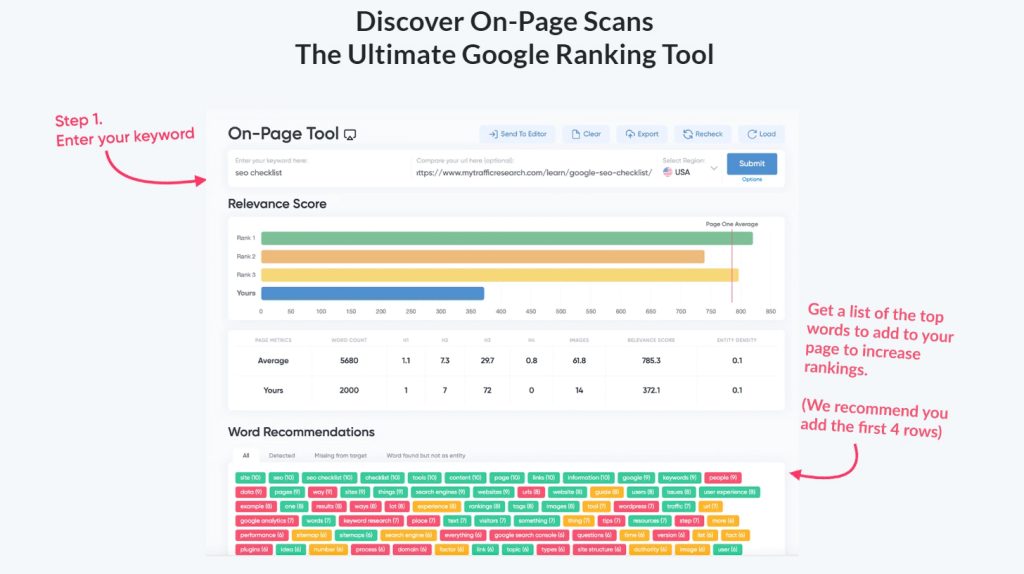
Keyword research is undoubtedly the foundation of on-page optimization. This component uncovers the keyword phrases that your target audience is actively seeking, which allows you to create high-quality content tailored to their needs. By doing so, you increase your chances of ranking higher in search engine results pages (SERPs) for those keywords and driving more organic traffic to your website.
For instance, imagine that you run a pet food e-commerce site and want to rank higher for the keyword phrase “best low-carb dog food.” Through proper keyword research techniques, you discover that a significant percentage of your target audience is searching for this term. You then optimize your landing page with relevant content and meta tags, resulting in a higher ranking on SERPs for that particular keyword phrase. Consequently, you attract more qualified traffic and boost your conversions.
To conduct successful keyword research, you need access to reliable tools that can help you identify the most relevant keywords for your niche. One such tool is Ahrefs’ Keyword Explorer, which allows you to analyze keyword volumes, difficulty levels, related terms and even provides helpful suggestions based on what others are searching for.
Additionally, Google’s Keyword Planner provides insight into potential keywords and helps businesses optimize their ad campaigns using those keywords. Both these tools provide essential elements such as competition analysis and cost-per-click (CPC). These metrics enable businesses to make informed decisions on target keywords and focus their marketing budgets effectively.
However, it’s not always about having the most popular keywords in play. In some cases, businesses can benefit from targeting less obvious or niche-specific keywords as they are less competitive yet still reach an interested audience subset. So while popular keyword searches are more predictable, they also tend to have greater competition resulting in lower return on investment (ROI).
Think of it like this, focusing on more niche-specific keywords is similar to having a specialty item in a shop that not everyone may want. Still, the people who need and desire it will come to your store, improving the potential for conversion.
Now that you understand how valuable keyword research is in optimizing on-page SEO, let’s explore how you can maximize the performance of your chosen SEO tools.
Maximizing SEO Tool Performance

Once you have access to the right SEO tool(s), it’s essential to get the most out of them by ensuring they are properly utilized and integrated with other optimization components.
For example, combining Google’s Keyword Planner tool with Ahrefs’ Keyword Explorer allows businesses to dig deeper into what their target audience is searching for even further. This process allows companies to pinpoint their efforts and focus more on targeting those high-performing keywords that can generate an impactful return on investment (ROI).
Additionally, using technical auditing tools like SEOCrawler together with content analysis solutions like On-Page.ai helps create a comprehensive overview of a website’s strength and weakness. Technical components such as website speed, broken links or duplicate tags can hurt rankings if left unaddressed while content enhancement solutions help ensure pages are optimized for both readability and relevancy.
It’s important to note that while these tools can provide invaluable insights into optimization possibilities and opportunities, they do have limitations. The effectiveness of any SEO tool depends on the data it has access to. Therefore, interpreting its recommendations requires some human touch – understanding context, competitors’ trends and nuances.
Think about it in cooking terms – even with technologically advanced kitchen appliances or culinary devices available; there’s a reason why chefs still need training to interpret flavors correctly. An over-reliance on tools without human interpretation can lead to ignoring critical factors which may hurt ROI.
Now that you have a thorough understanding of the keyword discovery and analysis spectrum, as well as how to maximize SEO tool performance, it’s essential to realize that on-page optimization is not just about keyword research and tool integration. When combined with other essential components such as technical auditing and content analysis tools, optimizing a website according to best practices in SEO helps businesses enhance their online visibility while driving traffic and increasing conversion rates.
Evaluating SEO Tool Effectiveness
Investing in an SEO tool is a great way to streamline your on-page optimization process and improve your website’s rankings. However, it’s important to evaluate the effectiveness of the tools you use to ensure that your investment is providing measurable results.
One way to evaluate the effectiveness of an SEO tool is by monitoring your website’s traffic and ranking fluctuations over time. If you notice a steady increase in traffic and rankings following the implementation of a new tool, then it’s safe to say that the tool is effective.
Additionally, it’s important to take into account other factors that may be contributing to your website’s success, such as changes in content strategy or external backlinks. To truly prove the effectiveness of an SEO tool, it’s necessary to conduct tests and comparisons with and without the tool.
Some argue that relying solely on SEO tools can be detrimental if they lead to complacency and neglect of other important factors like user experience and quality content. While these concerns are valid, it’s important to note that most modern SEO tools are designed to complement and enhance human effort rather than replace it.
Think of an SEO tool as a chef’s knife – while it may not guarantee a delicious meal on its own, it certainly makes food preparation faster and more efficient. However, even with a good knife, a skilled chef will still need to properly season ingredients, monitor cooking times and temperatures, and taste test throughout the process for optimal results.
When evaluating the effectiveness of an SEO tool, consider factors such as ease-of-use, accuracy of recommendations, compatibility with your existing workflow, and support/resources provided by the company. On-Page.ai has consistently received high marks in all of these categories from satisfied users.
Ultimately, whether you are a beginner or an experienced SEO professional, On-Page.ai is a powerful tool that will optimize your website pages for optimal search engine performance. With its various features and services, including On-Page Scans, Stealth Writer and Stealth ReWriter, On-Page.ai streamlines the on-page optimization process and improves your ranking metrics over time. So whether you are looking to improve your page’s relevance or just increase the number of organic traffic to your site, give On-Page.ai a try!
Common Questions
How often should on-page optimization be performed using these tools?
On-page optimization is a crucial aspect of SEO that requires a constant effort to keep your website’s search engine rankings high. While there is no one-size-fits-all answer to how often it should be performed, most experts suggest doing it every three to six months.
The reason for this frequency is that Google’s algorithms are perpetually changing, and your competitors are always trying to outdo you in search rankings. Frequent on-page optimization will help you stay ahead of the game and keep your website relevant.
According to a survey conducted by Search Engine Journal in 2021, websites that regularly updated their on-page optimization saw a 15% increase in organic traffic. Another study from Backlinko showed that websites with strong on-page optimization ranked higher in search engine results pages (SERPs) than those without it.
In conclusion, on-page optimization should be performed frequently, preferably every three to six months, to maintain high search engine rankings and stay up-to-date with Google’s algorithm changes. Across various studies, there has been an apparent correlation between frequent updates in on-page optimization and increased organic traffic and search engine rankings.
Are there any SEO tool bundles available that cover all aspects of on-page optimization?
Yes, there are SEO tool bundles available that cover all aspects of on-page optimization. These bundles include a wide range of advanced features and capabilities to ensure maximum optimization for your website.
One such bundle is the Moz Pro package, which includes tools for keyword research, content optimization, link analysis, and more. According to a survey conducted by Moz in 2021, users who use Moz Pro saw an average increase of 25% in organic traffic after six months.
Another popular option is the Ahrefs suite of tools, which offers advanced keyword research and competitor analysis features as well as an extensive technical audit tool. According to a study conducted by Ahrefs in 2020, websites using their platform saw an average increase of 61% in search traffic after one year.
Other options for comprehensive on-page optimization tool bundles include SEMrush, BrightEdge, and Raven Tools. These tools offer various features such as keyword tracking, site auditing, content optimization suggestions, and link building capabilities to ensure complete optimization of your website.
In conclusion, investing in these SEO tool bundles can lead to improved rankings and increased traffic for your website. With advanced features and capabilities offered by these tools, you can be confident that your website will be fully optimized for search engines.
Are there any SEO tools specifically geared towards optimizing mobile pages?
Yes, there are several SEO tools that are specifically designed to optimize the mobile pages of a website. With the ever-increasing number of users resorting to mobile devices to access the internet, it has become essential for websites to prioritize mobile optimization.
Some popular SEO tools for optimizing mobile pages include Google’s Mobile-Friendly Test, SEMrush’s Mobile Site Audit, and Ahrefs’ Mobile Performance Report.
According to Statista, as of 2021, 54.8% of all internet traffic comes from mobile devices worldwide. This statistic clearly highlights the importance of mobile optimization for websites.
Furthermore, a study conducted by Google found that 53% of mobile site visitors abandon a page that takes longer than three seconds to load. This emphasizes the urgency with which website owners must prioritize their site’s mobile speed and user experience.
In conclusion, optimizing a website’s mobile pages has become a crucial aspect of SEO in today’s digital landscape. There are numerous SEO tools available that cater specifically towards mobile optimization, and website owners must leverage these tools to ensure they are not missing out on potential traffic and revenue.
What criteria should be used to evaluate the effectiveness of SEO tools for on-page optimization?
When evaluating the effectiveness of SEO tools for on-page optimization, there are several criteria to keep in mind:
1. User Interface: A clear user interface can help you find the right features quickly and reduce the learning curve required to use the tool effectively.
2. Scalability: The tool should be able to handle small-to-large websites as your business grows.
3. Speed: The speed at which the tool works is important since a slow tool may decrease your efficiency and delay your results.
4. Features & Functionality: Look for SEO tools that have a complete range of on-page optimization features, including content optimization, internal linking, URL structuring, meta tags, heading tags, and images optimization.
5. Accuracy: Accuracy is crucial because incorrect data can lead to wrong decisions. Choose a tool that can provide reliable and updated data through regular updates.
6. Customer Support: Finally, availability of customer support is important in case of any technical difficulties while using the tool or when you require assistance with optimizing your website.
According to a survey by Moz.com, 64% of marketers said that utilizing SEO tools has helped them improve search performance and rankings. Therefore, evaluation criteria should be taken seriously while choosing an SEO tool for on-page optimization.
Can free SEO tools be just as effective as paid ones for on-page optimization?
Absolutely! In fact, some of the best on-page optimization tools are completely free. For instance, Google Search Console is an indispensable resource for site owners and webmasters looking to monitor and improve their website’s search engine performance. This tool provides valuable insights into how your website is performing, including data on organic traffic, search queries, and page impressions.
Another great free tool is Yoast SEO, which offers comprehensive on-page optimization recommendations to help you improve your content structure, keyword usage, and overall readability. With Yoast SEO, you can also optimize your meta tags and create custom XML sitemaps to ensure that your content is easily discoverable by search engines.
Of course, there are many other fantastic free SEO tools out there that can help with on-page optimization such as SEObility, Screaming Frog and Moz Local. So, whether you’re working with a tight budget or just starting out with SEO, there are plenty of effective free tools available to help you get the results you need.
That said, paid SEO tools do offer additional features that may be beneficial for larger websites or more complex campaigns. Paid tools like Ahrefs or SEMrush provide advanced keyword research capabilities, backlink analysis, and competitor tracking features, allowing you to gain a more comprehensive view of your website’s online market position.
Ultimately, whether you opt for free or paid tools will depend on the specifics of your situation and your goals. However, what is certain is that having access to the right set of SEO tools has never been more important for businesses looking to stay competitive in today’s digital landscape.




